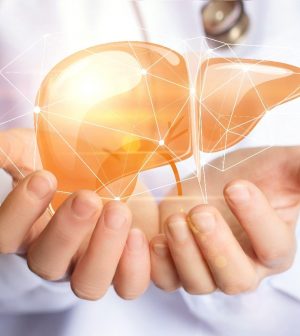- Could Your Grocery Store Meat Be Causing Recurring UTIs?
- Are You Making This Expensive Thermostat Error This Winter?
- Recognizing the Signs of Hypothyroidism
- 10 Strategies to Overcome Insomnia
- Could Artificial Sweeteners Be Aging the Brain Faster?
- Techniques for Soothing Your Nervous System
- Does the Water in Your House Smell Funny? Here’s Why
- Can a Daily Dose of Apple Cider Vinegar Actually Aid Weight Loss?
- 6 Health Beverages That Can Actually Spike Your Blood Sugar
- Treatment Options for Social Anxiety Disorder
New Tool Could Spot Liver Cancer Early, Upping Survival

A new AI-driven blood test could improve detection of liver cancer, which is one of the most fatal cancers because early diagnosis is difficult.
The test looks for “fusion genes” — two different genes that have become bound together, producing proteins that can lead to cancer.
A test for four specific fusion-gene combinations was 83% to 91% accurate in predicting the occurrence of hepatocellular carcinoma (HCC), the most common form of liver cancer, researchers reported recently in the American Journal of Pathology.
Accuracy increased to 95% when researchers combined a two fusion-gene search with an existing liver cancer screen that assesses the presence of alpha-fetal protein in the blood.
Liver cancers release alpha-fetal protein into the bloodstream, but that screening tool on its own is not always accurate, researchers explained.
“The fusion gene machine-learning model significantly improves the early detection rate of HCC over the serum alpha-fetal protein alone,” said lead researcher Dr. Jian-Hua Luo, a professor of pathology with the Pittsburgh Liver Research Center.
“It may serve as an important tool in screening for HCC and in monitoring the impact of HCC treatment,” Luo added in a center news release. “This test will find patients who are likely to have HCC.”
Up to 60% of liver cancers are only diagnosed in advanced stages, resulting in a survival rate of just 20%, researchers said in background notes.
“Early treatment of liver cancer has a 90% five-year survival rate, while late treatment has only 20%,” Luo said. “However, most liver cancers occur insidiously and without many symptoms. This makes early diagnosis challenging.”
To see whether a genetic search could help detect liver cancer, researchers looked for a panel of nine different fusion genes in blood samples from 61 HCC patients and 75 other patients with different illnesses.
Seven of the nine fusion genes were frequently detected in HCC patients, researchers found.
The fusion genes resulted from underlying abnormalities in cancer cells, researchers said.
“They were the products of pathologic processes essential for cancer development. Normal tissues did not contain these chromosome features and, thus, did not express these transcripts,” researchers concluded. “The detection of these fusion transcripts in the serum samples implies the presence of cancer cells.”
More information
The National Cancer Institute has more about liver cancer screening.
SOURCE: Elsevier, news release, June 17, 2024
Source: HealthDay
Copyright © 2026 HealthDay. All rights reserved.










